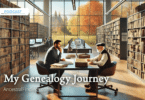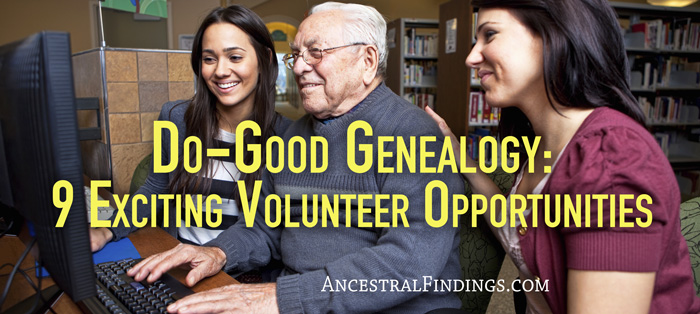Have you ever considered giving back to the genealogical community? Genealogy has typically been a solitary pursuit in the past. However, technology has allowed people from across the world to reach out to each other and connect, working on their shared family histories together. It is almost considered good genealogical manners these days to give back to the genealogical community in whatever way you are able, usually doing so as you do your own work. When we give back to the community, we are making tracing family histories easier on others, and they, in turn, will give back and make our own searches easier on us.
Giving back doesn’t mean you have to give away all of your precious research for free, either. This is often a concern for people who are saving original research for a book they will publish, or for a paper, they will present at a genealogical conference, or an article they will write for a genealogical magazine. You can keep your research safe and secret for as long as you need to, and still participate in giving back to others in the genealogical community.
Some of the most common ways of giving back are responding to your DNA matches on DNA websites whenever they reach out to you. Just an acknowledgement of their message to you is enough to make some people happy; others, you can give a tiny bit of information on your shared ancestry to, and they, in turn, may do the same for you, giving you information you previously did not have, or even providing a copy of a photo of a never before seen ancestor.
You can also give back by responding to people who reach out to you for family tree information on genealogy websites like Ancestry and FamilySearch. Again, only an introduction of who you are, how you are (or are probably) connected, and a tiny bit of information on your shared family history is enough to be considered polite, and will often be a big help to the person who sent you the message. Respond to these messages as quickly as you can, be polite in your tone, provide a tidbit of information, and you are giving back. And, new avenues of research and information can open up to you by doing so.
There are some other, less common ways of giving back to the genealogical community that you may want to consider. These projects can be quite rewarding, for you and for the other researchers who will benefit from them. For example, you can join an indexing project. If you have done any genealogy beyond talking to your living relatives, you have almost certainly used an index. They are almost as important to genealogical research as the actual records are.
If you have ever used a recordset that was not indexed, wasn’t it frustrating, or even impossible, time-wise, to browse through every single page of what may have been hundreds, or even thousands, of pages of records, looking for a mention of your ancestor, who may or may not be there? Indexes make that kind of searching unnecessary and make using important record sets easier for all genealogists. Think about it. Someone had to go through all 15 decades’ worth of US census records and create an index to the names of every single one of the millions of people on them, just so you and other researchers can easily look up your ancestors; actually, that indexing was done by dozens, even hundreds of people over a period of many years, and all genealogists benefit from it. You can help contribute to indexing projects online or offline, just by Googling for places looking for volunteers, or by going to your local archives, town historian, or historical society and asking if they need anyone to do some indexing for them.
You can also give back by adding to FindAGrave.com. This is a popular website among genealogists, and you have probably used it yourself, more than once. It relies on volunteers to take pictures of headstones, write up information on the cemeteries where the stones are located, and, for the really dedicated ones, to add biographical information and even photographs to the listings.
You can add to the database by photographing and providing information on any small, historic cemeteries near you that have not been added to the website’s database or completing work on a larger cemetery that is not fully indexed on the site. You can also create a free membership profile for yourself on the website, and fulfill requests people from around the world will send you to locate and photograph headstones of their ancestors who are in cemeteries near you.
In addition, you can make a contribution to a local or national genealogical society in the form of a financial donation. These groups make record resources available to people around the world who would not otherwise have access to them. They also engage in historical preservation projects, including record preservation. This helps current and future generations of genealogists. Usually, their membership fees barely cover their expenses, and some have no fees at all, relying entirely on the occasional grant and donations from generous people who believe in what the society is doing.
This means that you can send a donation in any amount to any genealogical society or group you choose, and no amount will be too small. It will all be appreciated. You can send a one-time donation, do a regular donation such as annually or twice annually, or you can even include planned giving to the society in your will (if you do this, talk to the person in charge of finances at that society, so they can plan their budget with your planned contribution in mind for the future). These are just some ways you can give back to the genealogical community. There are others. And, they are all needed and all rewarding. Choose one, and feel good about your place in the genealogical community.


